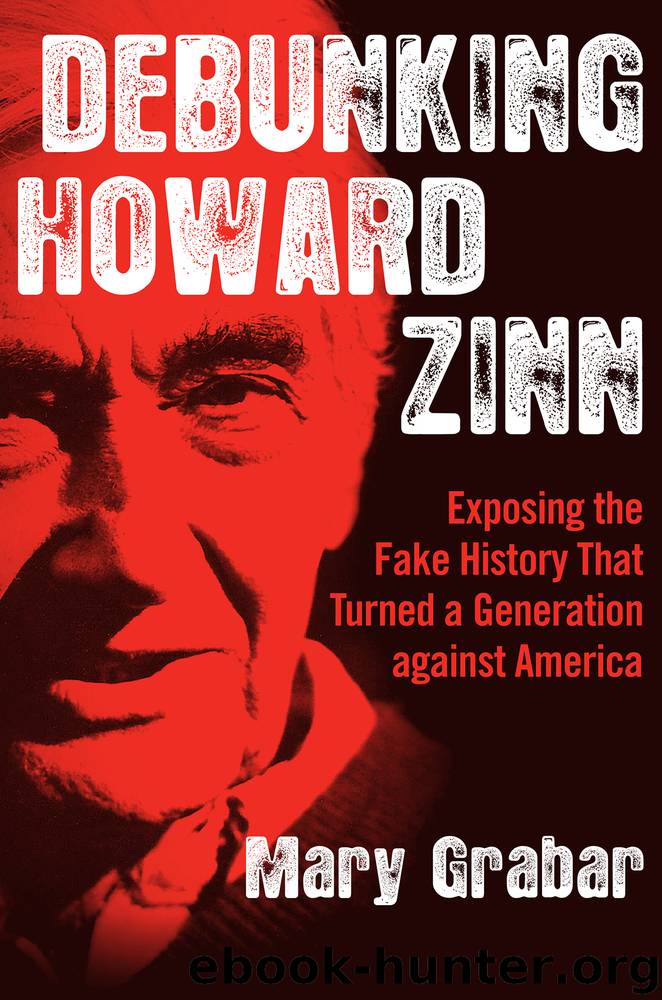Debunking Howard Zinn by Mary Grabar

Author:Mary Grabar [Grabar, Mary]
Language: eng
Format: epub
ISBN: 9781621578949
Publisher: Simon & Schuster
Published: 0101-01-01T00:00:00+00:00
CHAPTER
SEVEN
Black Mascots for a Red Revolution
“The black revolt of the 1950s and 1960s—North and South—came as a surprise. But perhaps it should not have. The memory of oppressed people is one thing that cannot be taken away, and for such people, with such memories, revolt is always an inch below the surface. For blacks in the United States, there was the memory of slavery, and after that of segregation, lynching, humiliation. And it was not just a memory but a living presence—part of the daily lives of blacks in generation after generation.”1
While the African Americans among whom Zinn lived in Atlanta certainly suffered from the indignities of segregation and prejudice, it would be an exaggeration to say that daily life for Spelman professors and students consisted of fear of an imminent lynching, that “revolt” was always “an inch below the surface,” or that mid-twentieth century African Americans remembered slavery. Zinn relies on an inordinate amount of creative literature to sell this take on the black experience in the twentieth century.
For example, Zinn quotes a famous poem by Harlem Renaissance author Claude McKay to illustrate the supposed “dangerous currents among young blacks,” which he claims Senator Henry Cabot Lodge warned about, but which Zinn himself celebrates:
If we must die, let it not be like hogs
Hunted and penned in an inglorious spot. . . .
Like men we’ll face the murderous cowardly pack,
Pressed to the wall, dying but fighting back!2
As it happens, McKay himself, who had been inspired to write “If We Must Die” by the race riots as soldiers returned from World War I and published the poem in 1919 in the Liberator, “insisted that the sonnet had universal intent.” Though the poem, he said, “makes me a poet among colored Americans. . . . frankly, I have never regarded myself as a Negro poet. I have always felt that my gift of song was something bigger than the narrow confined limits of any one people and its problems.” These words of McKay are reported in Harlem Renaissance by Nathan Huggins, the 1971 book that Zinn references on page 445 of A People’s History and includes in his bibliography. But Zinn ignores McKay’s own understanding of the appeal of his poetry beyond the confines of race. After “learn[ing] that a white American soldier, who had died on the Russian front in World War II, had this poem among his belongings,” McKay said, “I felt profoundly gratified and justified. I felt assurance that ‘If We Must Die’ was just what I intended it to be, a universal poem.”3
Zinn seems to want to confine black poets to a black ghetto. Rather than having universal appeal, their work is always about racial anger. He continues the literary redlining with his treatment of Countee Cullen’s poetry. By choosing to discuss only two of Cullen’s poems—“Scottsboro, Too, Is Worth Its Song” and “Incident”—Zinn gives the impression that he wrote mostly about race.4 In fact, Countee Cullen’s work transcends any single issue. He studied under Hyder E. Rollins, a John Keats scholar, at New
Download
This site does not store any files on its server. We only index and link to content provided by other sites. Please contact the content providers to delete copyright contents if any and email us, we'll remove relevant links or contents immediately.
| Anarchism | Communism & Socialism |
| Conservatism & Liberalism | Democracy |
| Fascism | Libertarianism |
| Nationalism | Radicalism |
| Utopian |
The Secret History by Donna Tartt(19023)
The Social Justice Warrior Handbook by Lisa De Pasquale(12182)
Thirteen Reasons Why by Jay Asher(8881)
This Is How You Lose Her by Junot Diaz(6868)
Weapons of Math Destruction by Cathy O'Neil(6260)
Zero to One by Peter Thiel(5780)
Beartown by Fredrik Backman(5729)
The Myth of the Strong Leader by Archie Brown(5491)
The Fire Next Time by James Baldwin(5421)
How Democracies Die by Steven Levitsky & Daniel Ziblatt(5208)
Promise Me, Dad by Joe Biden(5139)
Stone's Rules by Roger Stone(5077)
A Higher Loyalty: Truth, Lies, and Leadership by James Comey(4945)
100 Deadly Skills by Clint Emerson(4910)
Rise and Kill First by Ronen Bergman(4771)
Secrecy World by Jake Bernstein(4736)
The David Icke Guide to the Global Conspiracy (and how to end it) by David Icke(4695)
The Farm by Tom Rob Smith(4499)
The Doomsday Machine by Daniel Ellsberg(4480)
